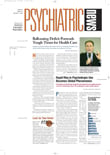Delusional “urgings from God” prompted a Texas mother to kill two of her three children last year without remorse, according to three forensic psychiatrists who testified at her trial.
The psychiatrists discussed their opinions in the case and contrasted it with another high-profile maternal filicide case, that of Andrea Yates, at the annual meeting of the American Academy of Psychiatry and the Law in Scottsdale, Ariz., in October.
On the night of May 10, 2003, in the tiny Texas town of New Chapel Hill, 39-year-old Deanna Laney used large rocks to crush the skulls of all three of her sons. She killed Joshua, 8, and Luke, 6; Aaron, aged 14 months, survived but sustained brain damage.
William Reid, M.D., M.P.H., a forensic psychiatry consultant in Horseshoe Bay, Tex., and former commissioner of mental health in Texas, was appointed by the court to evaluate Laney shortly after the murders and give his opinion about whether she was competent to stand trial, whether she was criminally responsible at the time of the offense, and what mental health services she might need.
After the attacks, Laney used a cell phone to call 911 “for instructions about what to do next,” said Reid, who is also a member of APA's Council on Psychiatry and Law.
“Her behavior at the time of arrest was psychotic,” he explained. “She did not indicate that she thought she had done wrong—there was no indication of remorse.”
It was only after Laney started taking antipsychotic medications several weeks after the crime that she began to “realize the enormity of what she'd done and developed a profound sense of regret and loss,” Reid said.
When he interviewed Laney, Reid learned that she believed she had been receiving “urgings” from God to kill her children for several days before the attacks.
“Within her delusional system, God showed her that if she didn't do this, things would be worse,” said Reid. He added that Laney believed she eventually would have had to strangle her children or kill them in a way she perceived to be more brutal if she denied God's initial instructions.
Reid diagnosed Laney with delusional disorder, grandiose type, manifested by religiosity and communication with God.
In Texas, the insanity defense rests on whether the defendant has knowledge that the act he or she committed was wrong. Reid advised the court that“ due to a severe mental illness, Laney did not know her conduct was wrong.”
Phillip Resnick, M.D., who served as an expert witness for the defense, agreed with Reid and described Laney as a loving mother who had home-schooled her children. He is a professor of psychiatry at Case Western Reserve University School of Medicine in Cleveland and director of Case Western's division of forensic psychiatry.
Resnick interviewed Laney six days after the murders and found “an absence of affect and a lack of remorse—she still believed what she had done was right,” he told attendees.
In addition, Laney believed that had she not obeyed God's instructions, she would have gone to hell and lost her soul, he said.
Laney told Resnick she believed her children would one day be resurrected. She believed “her actions were being directed by God as a test of her faith and that she was giving her children to God at the time she stoned them,” noted Park Dietz, M.D., M.P.H., Ph.D. Dietz, who was retained by the prosecution in the case, also found that Laney did not know right from wrong at the time of the murders.
Dietz is founder and head of the Threat Assessment Group Inc. and the forensic consulting firm of Park Dietz and Associates Inc., both of which are based in Newport Beach, Calif.
Dietz noted that Laney had had a psychotic episode three years before the offenses. Symptoms during both episodes included delusions of reference, olfactory hallucinations, choking sensations, intense fear, and a change in sleeping habits, he said.
Laney, who was a member of a Pentacostal church, had certain religious beliefs that might not easily be distinguished from some of her psychotic symptoms, Dietz noted. He explained that she was “completely immersed” in the local Pentacostal community, as was her immediate family.
Laney “repeatedly heard God speak to her,” Dietz said.“ She described this as an internal voice, but her description was similar to what you hear from other fundamentalist Christians who are free of psychotic symptoms.”
In addition to believing that God had spoken to her, other“ subcultural beliefs” related to her religion “could not be distinguished between her subculture on one hand and mental illness on the other,” Dietz commented. These included beliefs that God knew her thoughts and that she was receiving personal guidance from God that she called“ urgings or promptings,” he said.
“All of those beliefs are consistent with the teachings of her faith and are also consistent with psychosis,” he continued.
Dietz said he initially wondered why Laney kept God's“ instructions” to kill her children a secret, especially from her husband. She documented in a church workbook before the murders that“ her role in keeping the impending murders a secret was similar to Mary's role in keeping her pregnancy a secret.”
In 2002 Dietz was also retained by the prosecution in the case of Andrea Yates, a Texas mother who drowned her five children in June 2001.
Dietz testified that Yates suffered from a severe mental illness at the time of the offense but knew her actions were wrong.
He noted that Laney had incorporated Yates into her delusions—she believed that she and Yates would be the final two witnesses to the apocalyptic events described in the Book of Revelations.
Ultimately, the jury found Laney not guilty by reason of insanity, and she was sent to a maximum-security psychiatric facility for an undisclosed period.
Though the media linked Laney and Yates because they were both Texas mothers who were intensely religious and killed their children, the similarities stopped there, Dietz noted.
For instance, while Laney thought she had done the right thing and“ expected to go to heaven for sacrificing her children to God,” Yates expected to go to hell for the sin she committed and knew her actions were wrong, Dietz said.
Dietz testified that Yates did not meet the legal definition of insanity under Texas law because she knew killing her five children was wrong, even though she, like Laney, was psychotic at the time she committed the crimes.
Though several psychiatrists testified in Laney's trial, the jury's decision to find Laney not guilty by reason of insanity turned on the testimony of only one psychiatrist, according to Judge Cynthia Stevens Kent, who presided over the Laney case.
When Kent spoke to the jury after they made their decision, she said the jurors told her “the only psychiatrist that ultimately impacted their decision was Dr. Reid, who served as the court's psychiatrist,” she said, and was perceived by jurors as neutral. ▪

